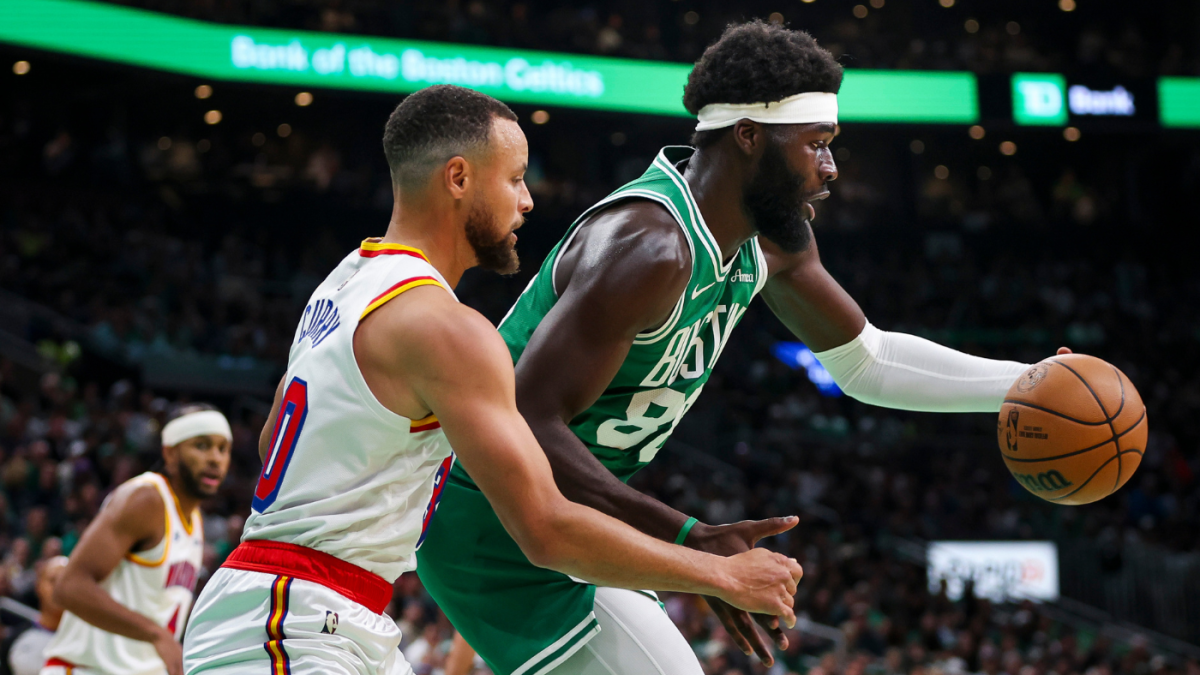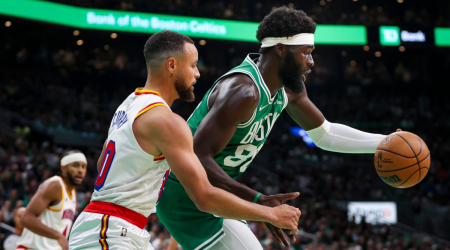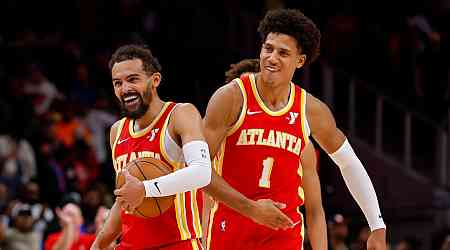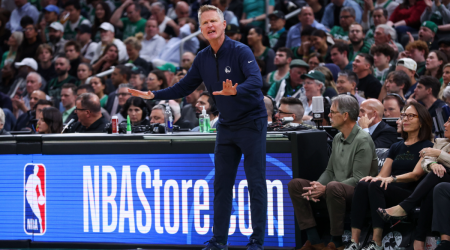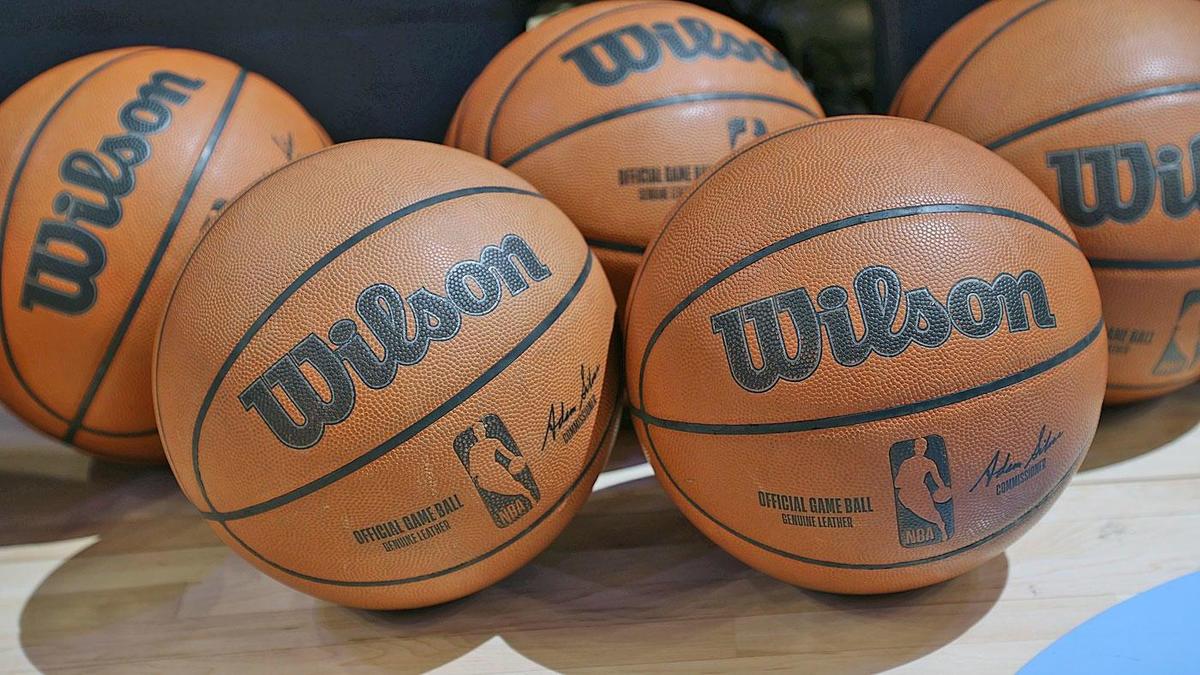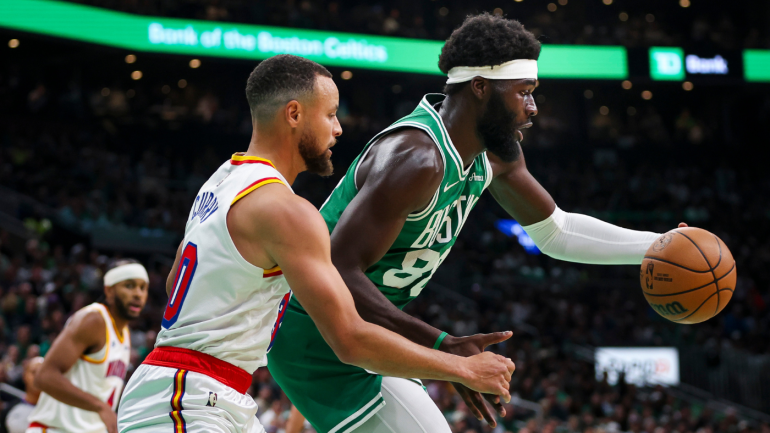
What can you add to the team that has everything?
The Boston Celtics are coming off of a 64-win season and a 16-3 march through the playoffs to the championship. After running back almost their entire roster, there was no reason to believe much of anything was going to change. In the grand scheme of things, it probably won't change too much. But in Wednesday's 118-112 loss to the Golden State Warriors, they may have just found an important new weapon.
The Celtics dominated the NBA last season largely as a jump-shooting team. Only two teams have ever made more 3-pointers than Boston did last season, and they ranked 21st all-time in 3-point percentage. Much of that success was possible because of their big men. In Kristaps Porzingis and Al Horford, Boston had two of the best shooting big men of all time, and that unlocked driving lanes for everyone else, which they used mostly to collapse defenses and pass into open 3-pointers. The tradeoff to all of those 3's? The Celtics ranked 27th in points in the paint.
The Celtics won't need to be a great paint team most of the time. They didn't on the way to their championship, after all. But sometimes, as was the case early in Wednesday's loss, the 3's aren't falling and it's nice to have an alternative. Enter Neemias Queta.
Queta has almost nothing in common with Porzingis or Horford. They were both top-three picks. Queta went in the second round. They arrived in Boston with fanfare. Queta arrived on a two-way contract. They shoot jumpers. Queta dunks. A lot.
In Boston's first seven games, Queta dunked eight times in 97 minutes. That ranked him No. 33 in the league in terms of dunks despite being one of only two players in the top 50 to play fewer than 100 minutes in that time. Playing time was available against Golden State, though, and Queta took advantage. He added four more dunks in 28 minutes on his way to perhaps his best game as a professional: 14 points, eight rebounds, and a team-best plus-13 point-differential.
Queta isn't the only Celtics big who can dunk. Luke Kornet did so at a slightly lower rate a season ago, but they get there in different ways. Kornet is a bit longer. Queta is more athletic. Kornet is typically ahead of Queta in the pecking order. On Wednesday, the Celtics decided to give Queta the start and see what he could do with it.
In a perfect world, teams would dunk on every possession. Defenses obviously have quite a bit to say about that. Dunks are among the most valuable shots in the NBA, and are therefore among the ones defenses work hardest to protect against. This is where Boston's shooting and creation come into play. Defenses have to work so hard to protect against those 3's and everything else Boston generates with its perimeter stars that dunks are available to the right dunker. An athlete like Queta certainly qualifies.
Boston's first play against Golden State is proof of that. The Celtics ran a guard-guard pick-and-roll between Derrick White and Jrue Holiday. Golden State defended it aggressively, allowing Buddy Hield to hang on the ball for a split second to try to pressure the ball out of White's hands and into Holiday's. This worked... but it also gave an All-Star in Holiday a 4-on-3 with his own man behind him. That forced low-man Trayce Jackson-Davis to rotate up into the paint, which left Queta all alone for the lob and dunk.
This is pretty standard offense against an aggressive defense, but it works because of the fear every other Celtic inspires. Draymond Green isn't going to help off of Horford, reasoning that a lob to Queta is less dangerous than a wide-open 3 for Horford. That's a reasonable calculus. It also allows for a wide-open dunk if the recipient is long enough and athletic enough to finish it. Queta is.
Let's fast-forward to the fourth quarter. On this play, Queta sets a screen for Payton Pritchard, who, to this point, had already made three 3-pointers on the night and 35 in nine games for the season. Notice how Kyle Anderson, Queta's man at the beginning of the sequence, keeps his eyes on Pritchard, the perceived greater threat. Queta cuts hard. White, a stellar passer, notices what's happening immediately and gets the ball into him. Kevon Looney is waiting at the rim, but Golden State's fear of Pritchard has given Queta a runway. He dunks with authority.
Our final dunk of the night comes on a play somewhat similar to the first. Holiday screens for Jayson Tatum. He has a runway to the rim. Hield, Looney and Green all keep their eyes trained on Holiday. That allows Queta to slip beneath the back line for a lob and a finish.
Queta did quite a bit more than dunk on Wednesday. His rebounding and rim protection went a long way as well. But the dunks are emblematic of Boston's wider dominance. These are, ultimately, not especially special shots for most athletic rim-finishers. What matters is that the Celtics are able to create them more easily than basically any other team. They just didn't have a big man who specialized in finishing them, or at least a willingness to to invest minutes into using him.
But Wednesday was proof of concept. Queta presents a combination of size, athleticism and basketball IQ capable of gobbling up all of those easy points his more famous teammates can create, and the value that offers has been evident statistically. Queta, not Tatum or White or Jaylen Brown, is Boston's leader in net rating this season at plus-22.7. It helps he's only played 125 minutes, but remember, we're talking about the Celtics here. They don't need a 30-minute center to do this most of the time. When Porzingis is healthy, there are going to be games in which they don't need Queta at all.
They're looking for a change-of-pace weapon to use when matchups or game flow dictates one could be useful. If Queta can be the player he was against Golden State for half of the minutes in a playoff series, he could swing the energy of a game or two if the Celtics aren't shooting well, or the fans just need a wake-up call. He is, in short, a valuable luxury.
That's the irony of this happening against the Warriors of all teams. Golden State succeeds on offense for many of the same reasons that Boston does. They invested heavily in a center, James Wiseman, hoping to get something similar, albeit consistently and at a higher level, to what Boston got out of Queta on Wednesday. In theory, Stephen Curry and Golden State's beautiful motion offense should have created an endless supply of easy dunks for an elite athlete. It didn't pan out for Wiseman, and the Warriors effectively wasted a No. 2 overall pick.
The stakes for Boston aren't nearly as high. They're paying Queta $2.2 million. They have no pressure to use him when they don't need to. It turns out that's what you get for the team that has everything -- a low-risk, high-reward specialist that fits your already stellar roster perfectly.


















